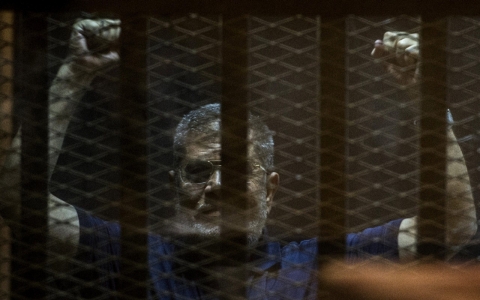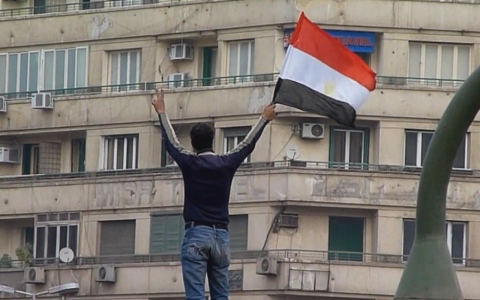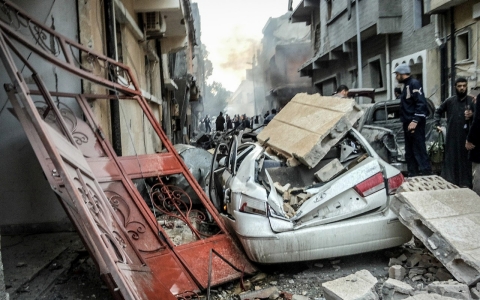A deadly and sophisticated attack by an ISIL affiliate in Egypt’s Sinai Peninsula on Wednesday and early signs of an escalated security crackdown by President Abdel Fatteh El Sisi have experts warning that more violence is just around the corner in the Middle East’s most populous country.
Two days after Egypt’s chief prosecutor was killed on the streets of Cairo — the country’s most significant political assassination in decades — members of an armed group called Wilayat Sinai, or the Sinai Province, launched an assault on the northern Sinai town of Sheik Zuwaid, holding their own for several hours until Egyptian forces, backed by F-16 warplanes, were finally able to drive them out. Dozens of Egyptian soldiers and police were killed in the assault, local media reported, along with over 100 fighters, according to Egypt’s military. The steep body count and heavy weapons deployed in the attack spurred Prime Minister Ibrahim Weleb to declare that Egypt is now “in a real state of war.”
The attack has worried many on the peninsula, where the group — formerly known as Ansar Beit Al-Maqdis, until it pledged allegiance to the Islamic State in Iraq and the Levant last year — has waged a low-level insurgency of sporadic hit-and-run attacks and suicide bombings since at least 2011. But Wednesday’s assault suggested an evolution of the group’s anti-government campaign: For the first time, it displayed tactics that closely resembled those of the organization to which it has pledged allegiance.
Just as ISIL has done in numerous assaults on towns in Syria and Iraq, the Sinai insurgents first set off a string of coordinated car bombs, simultaneously trapping police officers and soldiers in the town by booby-trapping roads. In a significant departure from the isolated potshots the Sinai fighters have taken at security targets for years, “they actually tried to take a town and control territory, which they’ve never done before,” said Patrick Skinner, an analyst at the Soufan Group, a security firm. “It shows a shift, that the group is more true to the ISIS name than we may have thought,” he said, using an alternative acronym for ISIL. “They’re learning tactics,” which may even suggest more direct communication with ISIL in Syria and Iraq.
Though the Sinai Province was unsuccessful in holding on to Sheik Zuwaid, analysts say there is reason to believe the group will strike again and soon. “The high degree of planning, the number of militants involved and the tactics used indicate that this was likely to be a probing operation intended to test the army’s capabilities and prepare the ground for capturing territory in north Sinai,” said Firas Abi Ali, the head of Middle East analysis for IHS Country Risk, a consultancy.
As was widely expected, Sisi reacted just hours after the attack by signing into law new anti-terrorism legislation that expedited criminal sentences, including executions. And in the latest sign that Egypt’s Muslim Brotherhood opposition could be held accountable — whether directly or indirectly — for the week’s violence, security forces on Wednesday killed 13 Muslim Brotherhood leaders accused of plotting attacks, in a raid outside Cairo. (The men’s relatives claimed they were unarmed and that they had already been arrested when they were each shot multiple times.) It is unclear whether these developments are related, but they fit the narrative Sisi has used to justify his ongoing crackdown on the country’s anti-secular political and military factions by conflating them as one “terrorist” entity.
Sisi’s critics, however, argue that his brand of iron-fisted reprisal has backfired and could even aggravate the situation. “The dominant faction in the security establishment is the old school,” which favors eradication, said Omar Ashour, an Egypt analyst and a senior lecturer at Exeter University. “They have this idea that they can bomb their way out of this problem, but this is not working.” The Brotherhood, in response to the killing of its members on Wednesday, has called for supporters to “rise in revolt” against the government.
Ashour noted that Wilayat Sinai, then under its former name, was significantly emboldened in late 2013 when Sisi began his far-reaching crackdown on Brotherhood supporters who protested after his military-backed uprising toppled Brotherhood leader Mohamed Morsi, the country’s first democratically elected president. As hundreds of Brotherhood supporters were killed in the streets or arrested and sentenced to death in mass trials, Ansar Beit al-Maqdis — which the Brotherhood says it has no relationship to, though both reject Sisi’s secular, military-backed rule — escalated its attacks in reprisal.
Others say Sisi’s security-minded response serves to distract from the societal and economic tensions in the Sinai that have provided fertile ground for ISIL and other insurgent groups to expand in the first place. For decades before Sisi came to power, Sinai residents complained that the peninsula was neglected and underdeveloped and that they have been relegated to second-class citizenship. More recently, the Egyptian government has demolished hundreds of houses along the border with Gaza to create a buffer zone to stem the flow of weapons between insurgents in the Sinai and Hamas, rendering thousands of Sinai residents homeless.
“You’re fostering the right environment to host an insurgency,” said Ashour, “and now they have the weapons and the angry young men too.” The way things are headed, Sisi could inadvertently be shaping Wilayat Sinai into “Egypt’s most powerful nonstate actor in a very long time.”

Death sentence of deposed president was upheld, but analysts are skeptical he will ever hang

The series of uprisings started a transformation but also created economic difficulties and sparked new conflicts

Egyptian president is lobbying the UN to stage a repeat intervention in Libya, this time targeting ISIL and its allies






Error
Sorry, your comment was not saved due to a technical problem. Please try again later or using a different browser.